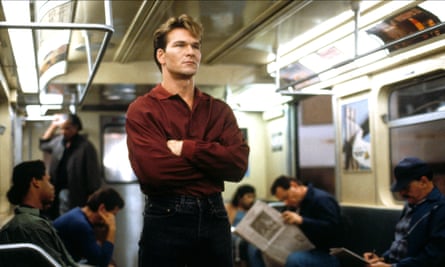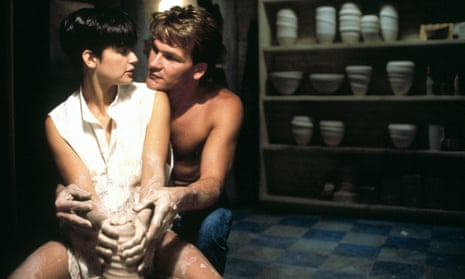Veteran producer-screenwriter Bruce Joel Rubin created a comfort-food weepie classic with his gem Ghost, the story of a murdered young man who sticks around as a ghost to watch over his grieving artist girlfriend. It is now rereleased in UK cinemas for the 30-year anniversary. This is a film that for its global army of fans attained a new level of sadness when its star, Patrick Swayze, died of pancreatic cancer in 2009 at the age of 57.
Rubin’s script is a lethally effective tragicomic fantasy. Ghost looks more Spielbergian every time I watch it, and Rubin must surely have hoped that the man himself might have been interested in directing – he has candidly admitted to being disconcerted when the studio put comedy specialist Jerry Zucker at the helm. But that choice was inspired. Zucker is a genius at spoofing certain genres in the service of deadpan gags; with Ghost he proved himself a master craftsman, knowing how to tell the story well and play it absolutely straight while also delivering the comedy where necessary.
Swayze plays hardworking young Manhattan banker Sam and Demi Moore plays his girlfriend Molly, who specialises in ceramic pots (which gives us one of the most loved and satirised set-pieces in modern movie history: Molly sensuously shaping clay as Sam embraces her from behind and the Righteous Brothers’ Unchained Melody plays on the jukebox, in the improbably vast bohemian apartment they are somehow able to afford). It all feels so weirdly innocent and romantic that there isn’t even really any smuttiness in the image of the pot rising under her caress. But one night, walking home after seeing a performance of Macbeth (an important ghost play), Sam and Molly are attacked by a mugger.
Perhaps it is uncool to admit this, but for me it was always a stunningly powerful coup de cinéma moment when Sam desperately chases after the retreating mugger following the attack, then walks back to see if Molly is all right, and is astonished by what he sees. In fact, the whole movie has that unselfconscious potency and force, advancing without a hint of irony the vision of good people going up to paradise and bad folks dragged away by dark demons to perdition.

Whoopi Goldberg is superb as the scam medium and fortune teller Oda Mae Brown, who has been ripping off grieving relatives for years and now discovers that she has indeed got the gift. Her presence triangulates the relationship with comedy.
Tony Goldwyn (grandson of legendary mogul Samuel Goldwyn) is also good as the creepy and duplicitous best friend Carl. It is a terrific scene when Carl comes round to Molly’s apartment to take advantage of her emotional vulnerability and put the moves on her – with ghostly Sam there in the room, seething with impotent protective rage.
Through a weird quirk of fate, Anthony Minghella’s film Truly, Madly, Deeply was released that same year: “the “British Ghost, with Alan Rickman as the dead partner who returns to help the grieving Juliet Stevenson. It is a very different film (she is immediately aware of his presence) and perhaps unfairly mocked as a luvvie-earnest exercise in British right-on-ness. But both, in their own ways, take the idea of grief seriously. (Though I remember when I first watched Ghost simply not being able to believe that Sam would not return, that it was all a mistake and we might somehow find out that he had been put on life-support system in hospital in a persistent vegetative state. But no.)
Watching it again now, you might feel the yuppie-skulduggery theme is a bit dated – and ghostly Sam (or anyone else) should have been telling Molly to change the locks at her apartment. But Swayze has a robust charm and Moore gives it her all, despite being on the verge of being upstaged at all times by Goldberg and Swayze. There’s an ectoplasm of goofy Hollywood magic.
Ghost is rereleased in the UK on 14 February.

Comments (…)
Sign in or create your Guardian account to join the discussion